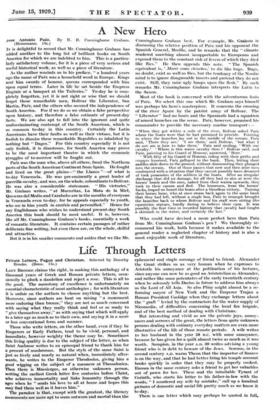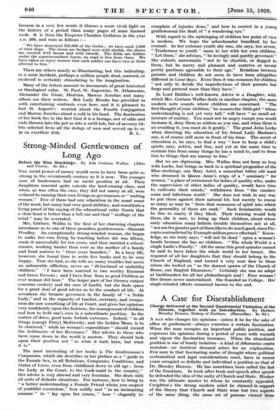Life Through Letters
Private Letters, Pagan and Christian. Selected by Dorothy Brooke. (Benn. 15s.) Lam, BROOKE claims the right, in making this anthology of a thousand years of Greek and Roman private letters, occa- sionally to pluck a dandelion and reject a rose. This is all to the good. The monotony of excellence is unfortunately an essential characteristic of most anthologies ; for with literature it is unfair on the authors to choose anything but the best. Moreover, since authors are bent on raising " a monument more enduring than bronze," they are not so much concerned with saying what they really think and feel or so ready to " give themselves away," as with saying that which will apply to a later age as much as to their own, and saying it in a more or less conventional form and manner.
Those who write letters, on the other hand, even if they be Emperors or Early Fathers, tend to be vivid, personal, and immediate, however weighty the theme may be. Sometimes this living quality is due to the subject of the letter, as when Saint Ambrose writes to an episcopal friend to thank him for a present of mushrooms. But the style of the same Saint is just as lively and nearly as natural when, immediately after- wards, he writes to the Emperor Theodosius, giving him a good wigging on the subject of a massacre at Thessalonica. Then there is Mnesiergus, an otherwise unknown person, writing the earliest Greek letter five centuries before Christ, who achieves immortality and links humanity through the ages when he " sends his love to all at home and hopes this may find them well as it leaves him."
The paradox is that, except with the greatest, the literary monuments are more apt to seem outworn and mortal than the ephemeral and single message of friend to friend. Alexander the Great strikes us as very human when he expresses to Aristotle his annoyance at the publication of his lectures, since anyone can now be as good an Aristotelian as Alexander, and rather like some potentates of the early twentieth century when he solemnly tells Darius in future to address him always as the Lord of All Asia. So also Pliny might almost be a re- forming mayor of New York and the Emperor Trajan a Roman President Coolidge when they exchange letters about the " graft " levied by the contractors for the water supply of Nicomedia, of difficulties concerning the local fire brigade, and of the best method of dealing with Christians.
But interesting and vivid as are the private joys, annoy- ances and sorrows of the great, the letters from quite unknown persons dealing with ordinary everyday matters are even more illustrative of the life of those remote periods. A wife writes to her husband in the year 28 B.c. with some annoyance, because he has given for a quilt almost twice as much as it was worth. Sarapion, in the year A.D. 89 writes advising a young friend who is in debt to beware of the Jews. Serenus, in the second century A.D. warns Theon that the inspector of finance is on the way, and that he had better bring his temple account books quickly in order that they may be properly cooked. Enusea in the same century asks a friend to get her valuables out of pawn for her. These and the inimitable Tyrant of Corinth, who starts his letter to his father-in-law with the words, " I murdered my wife by mistake," call up a hundred pictures of domestic and social life pretty much as we know it to-day.
There is one letter which may perhaps be quoted • in full, because, in a very few words it throws a more vivid light on
the history of a period than many pages of some learned work. It is from the Emperor Claudius Gothicus in the year A.D. 269, and runs as follows :— " We have destroyed 320,000 of the Goths ; we have sunk 2,000 of their ships. The rivers are bridged over with shields, the shores are covered with lances and with swords. The fields are hidden under the superincumbent bones, no road is free from them. We have taken so many women that each soldier can have two or three allotted to him."
There are others nearly as illuminating, but this indicating, as a mere incident, perhaps a million people dead, maimed, or enslaved is certainly stimulating to the imagination.
Many of the letters amount to documents of great historical or theological value. St. Paul, St. Augustine, St. Athanasius, Alexander the Great, Hadrian, Marcus Aurelius and many others are their writers. But Lady Brooke has provided us with entertaining contrasts even here, and it is pleasant to find St. Augustin worried about the Fourth Conjugation and Marcus Aurelius about a cold in his head. The fascination of her book lies in the fact that it is a farrago, not of odds and ends thrown into the pot as into a swill-tub, but of savoury tit- bits selected from all the doings of men and served up to us







































 Previous page
Previous page